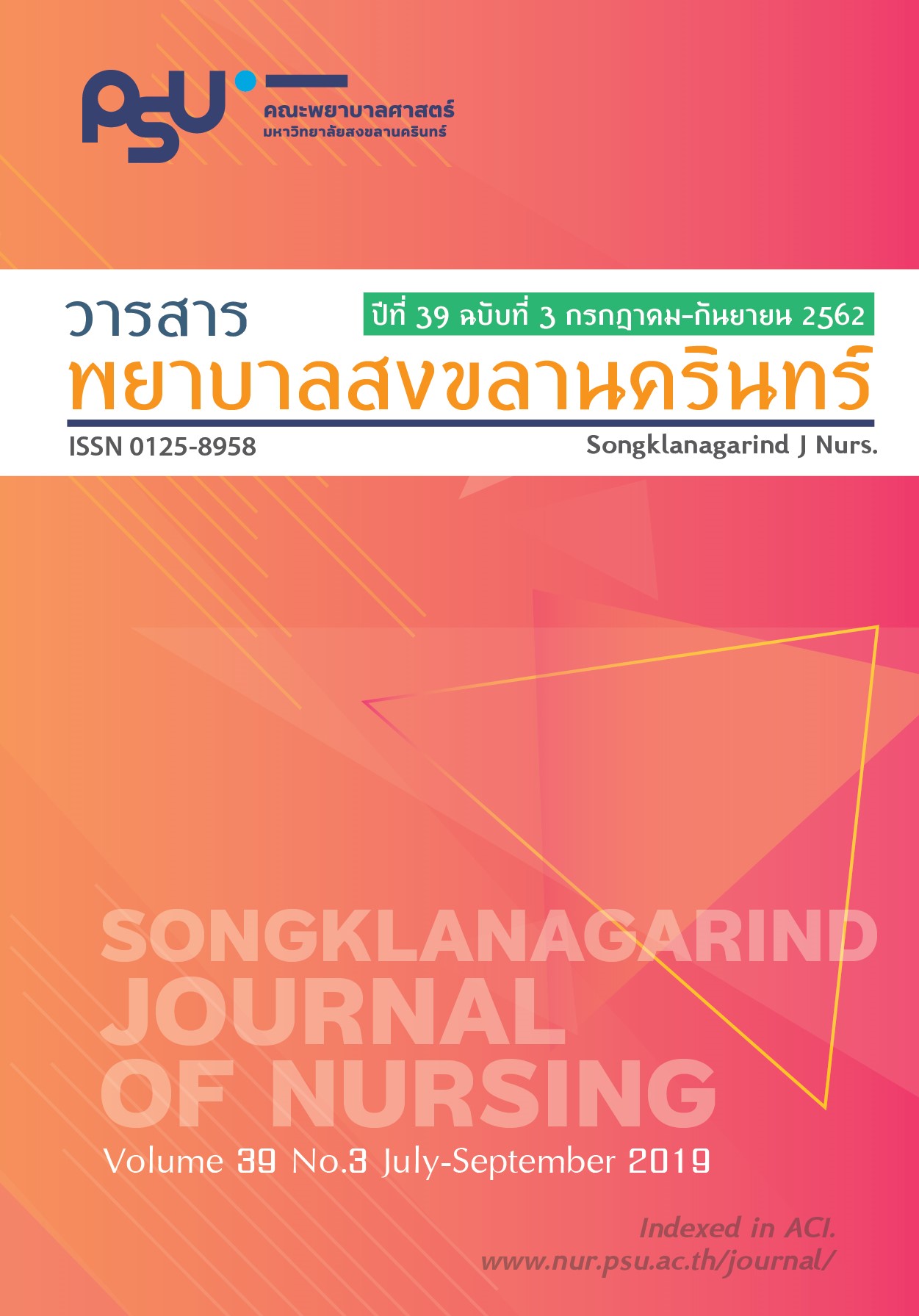Guideline Improvement for Health Behavior Modification to Promote Self-Efficacy of Pre-Diabetic Patients at a Community in Kalasin Province
Main Article Content
Abstract
This action research was conducted to study behaviors, self-efficacy and factors of health behavior of pre-diabetic patients and to guideline improvement for health behavior modification in the context. The target group consisted of 25 pre-diabetic patients, 7 family caregivers,10 public health volunteers, 3 community leaders and 1 health officer from Health Promoting Hospital. Qualitative data were analyzed using content analysis. Quantitative data were analyzed using frequency, percentage mean and standard deviation.
The result showed that the overall health behavior of pre-diabetic patients were middle level (M =2.94) and the perception of self-efficacy was high level (M =3.25). There were 4 impact factors to health behavior consisted of : 1) Individual factors, 2) Environmental factors, 3) Family caregiver, and 4) Community participation factors. The guideline improvement as follow; 1) The activity to exchange the knowledge and plan to guideline improvement for health behavior modification., 2) The workshops to educate and promote skill., 3) The activity to exchange the knowledge with pre-diabetic patients model, 4) The activity to practice and develop skill to continue. The overall activities were supported from family caregiver who prepared menu of healthy food, activated and encouragement, 5) The home visit activity from health officer and public health volunteer., 6) The community leaders gave the knowledge and to assist equipment and place for exercise., and 7) The health officer had a guideline for health behavior modification.The evaluation revealed as the following; 1) Pre-diabetic patients had more the mean score in health behavior and perception of self-efficacy (M =3.38, 3.56). Thus, nurse should apply this guideline improvement in the closet context by family and community participation.
Article Details
References
Strategy and planning division, Ministry of Public Health. Thailand Health Lifestyle Strategic Plan 2011- 2020. Bangkok: National Office of Buddhism; 2011. Thai.
American Diabetes Association. Classification and diagnosis of diabetes. Diabetes Care. 2017; 40(Suppl 1): S11-24.
Sunthornyothin S, Buranachapkajorn P, editors. Diabetes mellitus. Bangkok: Chulalongkorn university press; 2013. Thai.
Ngatena, I.J., & Kapustin, J.F. Preventing type 2 diabetes: What really works ?. J Am Assoc Nurse Pract. 2011; 7(7): 555-558.
Bureau of Non Communicable Diseases. Annual report 2015. Bangkok: WVO officer of printing mill; 2016. Thai.
Oba N. Health promotion and prevention of diabetes mellitus. Phitsanulok: Downngearn press; 2012. Thai.
Balk, E.M., Earley, A., Raman, G., Avendano, E. A., Pittas, A. G., & Remington, P. L. Combined diet and physical activity promotion programs to prevent type 2 diabetes among persons at increased risk: A systematic review for the community preventive services task force. Ann intern med. 2015; 163(6): 437-51.
Tuomilehto, J., Lindstrom, J., Erilksson, J. G., Valle, T.T., Hamalainen, H., Parikka, I. P., et al. For the finnish diabetes prevention study group. N Engl J Med. 2001; 344(18): 1343-1350.
Diabetes Prevention Program (DPP) ResearchGroup. The diabetes prevention program (DPP): Description of lifestyle intervention. Diabetes Care. 2002; 25: 2165–2171.
Bandura, A. Self-Efficacy: Toward a unifying theory of behavioral change. Psychol Rev. 1977; 34(2): 191-215.
Resnick, B. Theory of self-efficacy. In Mary, J.S., & Patricia R. L., editors. Middle range theory for nursing. 3rd ed. New York: Springer; 2014.
Kalampakorn S. Application of concepts and theories to health promotion and prevention in community. In: Powwattana A, Kalampakorn S, Lagampan S, Amnatsatsue K, editors. Health promotion and disease prevention in community : An application of concepts and theories to practice. 3 rd ed. Bangkok: klungnanavitthaya press; 2013. P. 29-69. Thai.
Wongsricha W. Application of self-efficacy program for changing health behaviors in diabetes high risk group at nakae community hospital, Nakhonpanom province [dissertation]. [Khon Kaen]: Khon Kaen University; 2012. 219 p. Thai.
Sandee T, Leelukkanaveera Y, Homsin P. The effects of self-efficacy enhancement on health promotion behaviors, body weight and fasting plasma glucose among pre-diabetes in the community. Songklanagarind J Nurs. 2017; 37(2): 53-66. Thai.
Department of Health, Ministry of Public Health. Strategy plan to development health and environmental health system of national health development plan in the twelfth national economic and social development plan 2017-2021. Nonthaburi: Ministry of Public Health; 2016. Thai.
Lewin, K. Action research and minority problems. J Soc Issues. 1946; 2(4): 34-46.
Bandura, A. Self-efficacy: The exercise of control. USA: Eleventh Printing; 1997.
Chirawatkul S . Qualitative study in nursing: Research methodology and case study. 2nd ed. Bangkok: S. Asia press; 2012. Thai.
Jaikhamwang N. Risk behaviors of diabetes and hypertension risk groups: A case study in ban pak ka yang sub-district health promoting hospital, Sukhothai province. JCDLQ. 2015; 3(2): 173-184. Thai.
Kulprateepunya K, Viriyaseubpong P, Viboonchai R, Kosalawit T. Self-care behaviors of diabetic risk group in south-esan, thailand. SCNJ. 2017; 4: 19-33. Thai.
Chaikoolvatana C, Jaimalai W, Sutti P. Factor predicting health behavior in group of pre – diabetes, Phayao province. Journal of Nursing and Health Care. 2016; 34(4): 115-122. Thai.
Khantigaro P. Preventive behaviors: perceptions and experience of people at risk for diabetes mellitus (DM). JCDLQ. 2015; 2(3): 129-143. Thai.
Dendup, T., Feng, X., Clingan, S., & Astell-Burt, T. Environment risk factors for develping type 2 diabetes mellitus: a systematic review. Int J Environ Res Public Health. 2018;15(78): 1-25.
Kaewsringam P, Nirattharadorn M, Wattana C. Factors predicting type ii diabetes mellitus preventive behaviors among people at risk for diabetes. JNSCU. 2015; 27(2): 119-130. Thai.
Nakhamin K, Chomnirat W, Limtragool P. Diabetes prevention strategies by community participation. Journal of Nurses’ Association of Thailand, North-Eastern Division. 2011; 31(1): 43-51. Thai.
Khomarj S. The development of prediabetis prevention in health promoting hospital [dissertation ] . [Khon Kaen]: Khon Kaen University; 2015. 218p. Thai.
Eunmung M. Community participation in development of health promotion for pre-diabetes type 2 in a community at chaiyaphum province [dissertation] . [Khon Kaen]: Khon Kaen University; 2014. 248 p. Thai.
Pitchalard K, Reangsing C and Moonpanane K. Development of type 2 diabetes preventive model for diabetic risk group in community, Chiang Rai province. JNSCU. 2016; 28 (3):132-146. Thai.

